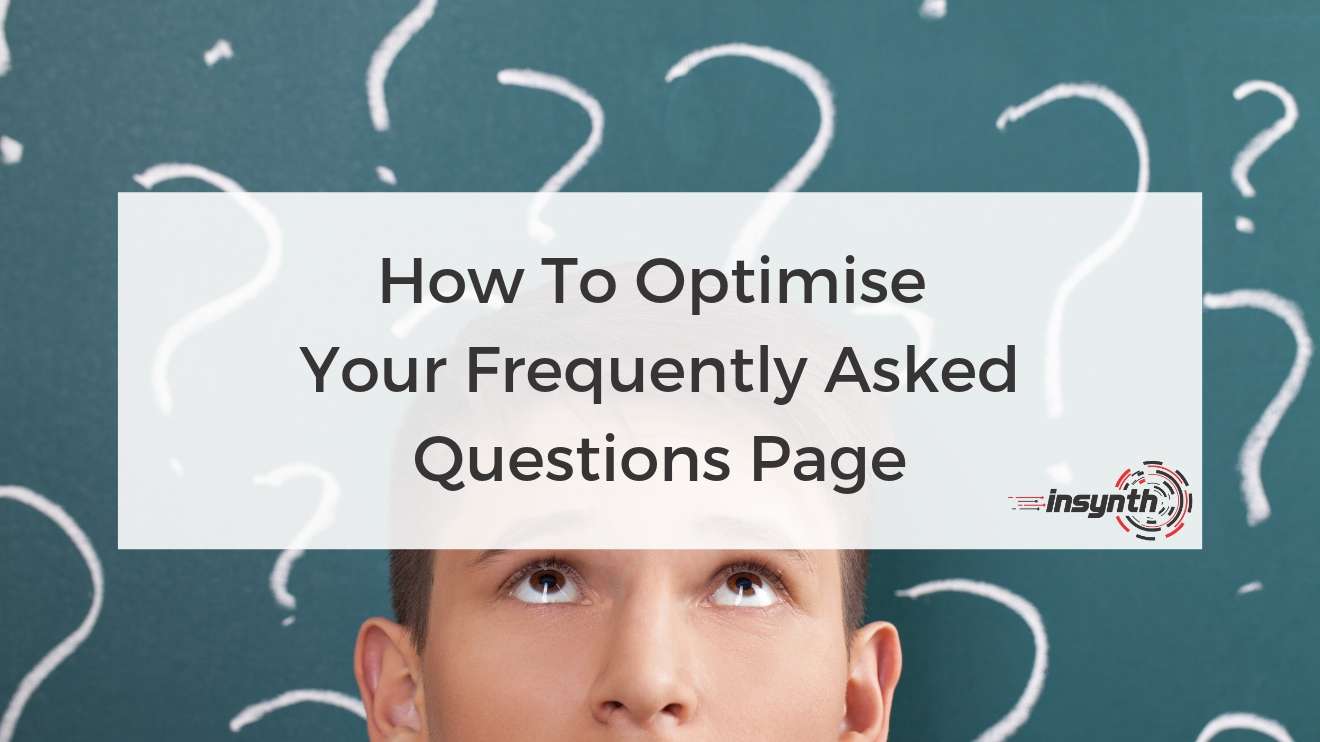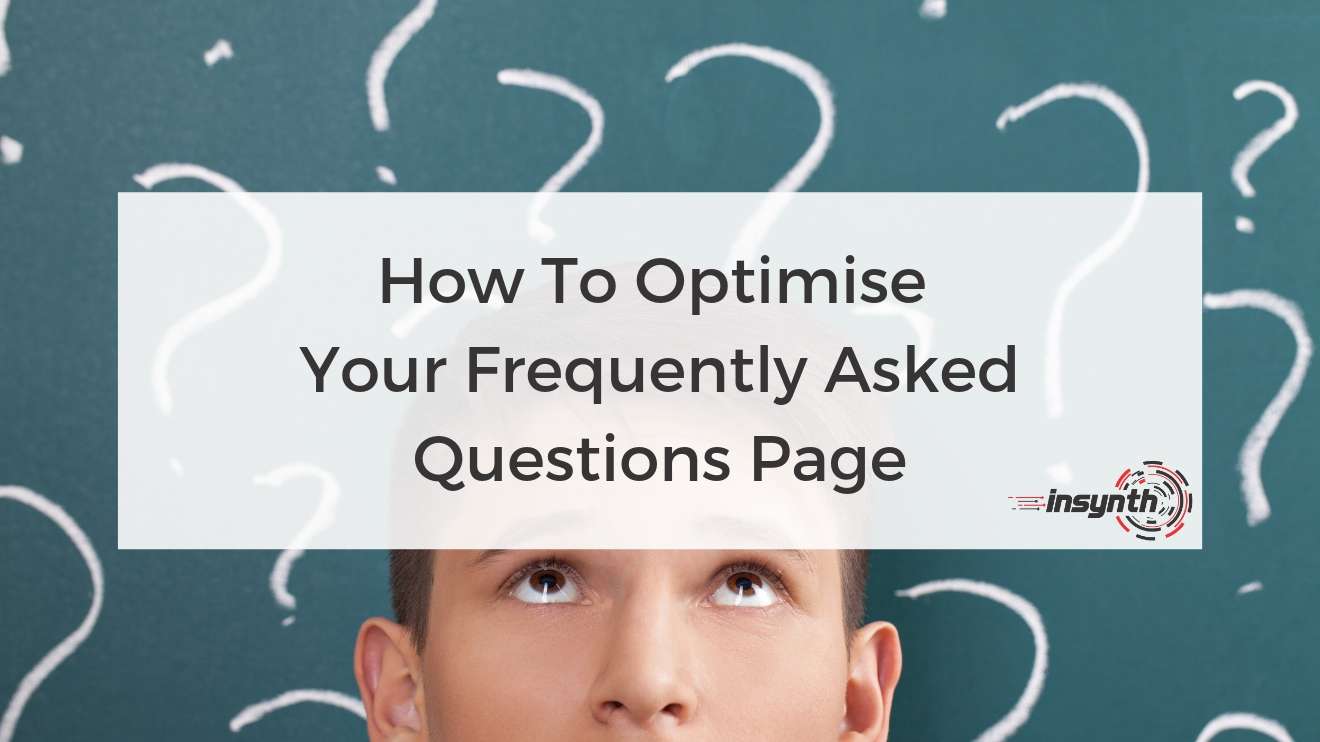4 min read
How To Optimise Your Frequently Asked Questions Page
![]() Olivia Atkinson
:
26-Apr-2019 11:48:16
Olivia Atkinson
:
26-Apr-2019 11:48:16


Most websites have a FAQ page somewhere on their website but they’re not always optimised for search engines. You may not even need a FAQ section but its become a page that is seen as important as ‘About Us’ and ‘Contact Us' pages.
David Hamill advises that if your FAQ page is answering questions that the rest of the website should answer, then you have a problem with your site content.
Some people overlook the potential and the opportunity FAQ pages offer, with many including questions that are very samey and repetitive, providing answers that come across as patronising.
What Is A FAQ Page And Why Should I Have One?
A FAQ page is a web-page dedicated to listing and answering ‘frequently asked questions’ from website visitors.
Through answering popular questions you can relieve repetitive work from your customer service teams, you’re also able to assist visitors with the answer when you may not be able to give one (out of hours).
It also acts as a first point of contact for customers looking for answers before they reach out to you directly, giving you more qualified and educated leads.
If you don’t already have a FAQ question then don’t just create one for the sake of it, if your site can answer the questions without calling it out on a separate page, then just ensure your website copy is optimised.
However if your sales/service team is dealing with recurring questions about product or service, and there are questions being asked that can’t easily be addressed in an existing section on your website then a FAQ page is for you.
When done correctly FAQ can be a great platform for improving authority and ranking through SEO.
Best Practises For FAQ Pages
If you have a variety of FAQs that are naturally forming groups then segment them into sections to create a positive reader experience.
For example if you have more than one question about installing, specification, delivery and payment options then categorise them to make them quicker to find.
Another thing that many building product companies are guilty of are making up questions or assuming what questions customers would ask.
With this comes questions that your customers shouldn’t be asking as your website should address basic information about your product or service.
Many FAQ are too brief, allowing for only a short and to the point answer. Your FAQ page is an opportunity for you to present yourself as the expert within your sector about your specific product.
Tip: When you receive questions by a query form or on the phone, forward the question and the answer onto the marketing department to add to the FAQ page on your website, this way its stays fresh and relevant. You should find that less questions get asked as you address and share common queries.
How To Make My FAQ Search Engine Friendly
The first and most important tip is to write your questions from your customers perspective (How do I…) and answer them from your businesses perspective (You should… or We provide…).
This is key as many people will have turned to search engines with a question in the style of ‘They Ask, You Answer’.
Secondly if you have original pictures that can explain the answer better then use them, especially on specific parts to products like spare parts. Don’t forget to ensure your images are optimised with appropriate alt texts.
The next key point is to include hyperlinks, remember that if people are searching with a question they may have landed on your FAQ page with no knowledge or awareness for your company.
By inserting hyperlinks that provide the visitor with additional knowledge on specific points you ensure they stay on your website until they find the answer they’re looking for, giving you the opportunity to educate them further.
Your answers should be detailed but don’t repeat content that’s on other pages as it will put people off if the answer is too lengthy.
By giving the option to read more about something you improve the visitors' experience on your website, hopefully encouraging them to stay on for longer and find out more about your brand.
As well as linking to pages, link to downloadable content or a blog that addresses the question in much more detail.
Give your visitor the option to ask a question they can’t find the answer too, you can do this by inserting a form. This will also provide an additional question and answer that you can then add to your page.
As well as a form, have another CTA to give them options, your company contact number or a live chat would be ideal.
Different people and buyer personas act differently, some prefer to talk directly to the company, others prefer to find information for themselves in the easiest way possible without making contact.
Conclusion
FAQ pages can be a great platform to get people onto your website. You need to provide the answer to their question in as much detail as possible by nurturing them through different content and having call to actions in place.
Ensure you don’t use your FAQ page as an alternative to addressing topics and questions that could benefit from having their own section on your website. If this isn’t doable, dedicate a blog post to one question so you can go into detail, then link to this in your answer on your FAQ page.
To get a real insight into how people use your website and what pages they navigate to and from, Site Uncovered gives you live recordings that show exactly how visitors move around and where they drop off; allowing you to improve your funnel analytics and optimise your website for lead generation.
|
Read More |
About Insynth
As the only HubSpot certified agency to major on construction marketing, we bring together construction marketing strategy, digital strategy, website design, SEO, content marketing, email marketing, sales automation, marketing automation and HubSpot CRM implementation to produce successful campaigns and great results for our clients.

